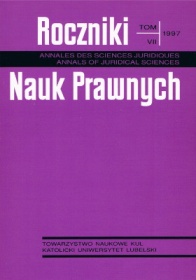Zasady nadzoru nad pośrednikami rynku kapitałowego w prawie europejskim
Abstrakt
This work aims to contribute to the construction of a common group of legal principles concerning the supervision on all the intermediaries of the capital market. Our attempt seems to be justified by the following reasons: 1) the existing link between the financial intermediaries and the regulated markets; 2) the need of a real and fair competition within the whole system of the financial intermediation; 3) the need for an efficient supervision. In the European regulations for the intermediaires of the capital market an important role is played by the rules of international Law, which influenced the adoption and the evolution of the European system of supervision first for the banks, and then for other financial intermediaries (including regulated markets and clearing houses).
The supervision on the intermediaries of the capital market in the European Community is characterized by; the principle of the home country control, the principles of capital and technical adequacy, the principle of transparence, and the principle of uniformity of the rules of publishing information concerning the instruments traded on the regulated markets of the different member States.
The principle of the home country control implies the mutual recognition of the legal system of the member states. It is made possible only when there exist some common rules concerning capital and technical adequacy. In these matters, the supervision is performed by the authorities of the member state of origin. When the supervision refers to a company closely related to other foreign companies, the role of the authorities of the guesting state has gained of importance. For what concerns the relationship between the intermediary and the investor, the supervision is performed by the authorities of the State in which the activity takes place.
In this way, the system of supervision on the intermediaries of the capital market takes the form of a network, in which the competent authorities of the State of origin and of the guesting State, ask and receive information from the intermediary and other authorities. A closer relationship with the system of the members State of origin characterizes the regulated markets and the clearing houses.
Copyright (c) 1997 Roczniki Nauk Prawnych

Utwór dostępny jest na licencji Creative Commons Uznanie autorstwa – Użycie niekomercyjne – Bez utworów zależnych 4.0 Międzynarodowe.


